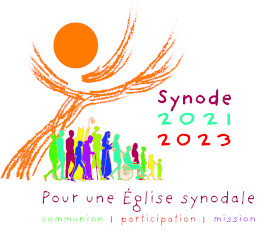 The Synod on synodality, desired by Pope Francis, began on 17 October. Communion, participation and mission are the three key words of this synod which is there to answer a fundamental question: How does synodality, the journey together in the Church, take place today at different levels in order to announce the Gospel? And what steps does the Holy Spirit invite us to take in order to grow as a synodal Church?
The Synod on synodality, desired by Pope Francis, began on 17 October. Communion, participation and mission are the three key words of this synod which is there to answer a fundamental question: How does synodality, the journey together in the Church, take place today at different levels in order to announce the Gospel? And what steps does the Holy Spirit invite us to take in order to grow as a synodal Church?
The aim of this Synod is to be able to discern the processes of seeking God’s will and pursuing the paths to which He calls us.
Here is a short synthesis made, for the General Council of the SVECJ, by Gwennola Rimbaut, of the 24 responses received from different teams: Peru (3: P1 to P3); Vietnam (1: V1); Madagascar (1: M1); Reunion (1: R1); France-Belgium (18: FB0 to FB17).
Synodality and FCU
The experience of synodality (or missionary communion) is lived especially in our SVECJ and Cor Unum Family teams because of our “Life Project”, our diverse states of life (without hierarchy between clergy and laity), the practices of regular consultations, elections with limited terms of office, our Ignatian spirituality..
In the CU Family we have learned to live in a less clerical Church… We have moved from a clerical functioning to a fraternity of baptized people, either clerics or lay people. (…) The Cor Unum Family appears to us as an educator of synodality” (FB4). There is “the regular practice of consultation, listening and discernment” (FB11).
![]() Découvrir le Projet de Vie de la SVECJ
Découvrir le Projet de Vie de la SVECJ
In the parish
A half-hearted experience of synodality in relation to the parishes: The members of the SVECJ are or have been very involved in the parishes in the various services, not forgetting the priests and deacons of the SVECJ who are ordained to serve the life of the Church. All goes well when the relationship with the parish priest is simple and fraternal, with an openness to the world. Unfortunately, many situations come to light that indicate the opposite: a sense of identity, authoritarianism, fear of the world on the part of many clerics (including bishops).
Ecumenism and inter-religious
Link to other denominations and religions: the situation in France-Belgium is very different from that in Madagascar, Reunion, Peru… Relations are not very developed in France-Belgium but are occasional, whereas they are vital and obvious in other countries where religion is omnipresent and very diverse. Mention of tensions in Peru with the evangelists (during charity work in the poor “Barrios” districts).
At the heart of the world and its peripheries
Link to the peripheries: this link is essential for the members of the SVECJ, who are very involved in services for the sick and isolated, but also in associations helping migrants, etc. The peripheries are not considered central enough in the parish communities, not listened to enough… a challenge for the future! “Take the time to listen to the world from the peripheries, which must become the central concern of the Church;
“To listen to the faith of the poorest people and to let ourselves be evangelised by them. The conversion of the Church passes through the poor, through friendship lived with them! (FB17).
Openness for the future
Many proposals for the future: Many wishes around the formation of clerics and laity to increase the qualities of listening, dialogue and openness to the world and to difference; consider opening ordained ministries to women, to married men; rethink the governance of the Church by entrusting responsibilities to lay people, to women and to everyone according to their abilities (disabled people, “poor”…)
- Emphasise team life: “the review of the mission at all levels” (FB3); “community discernment is indispensable” (FB4)
- Of course, as a priority: accentuate listening to the most excluded, because they will convert us… Be aware that “the Spirit is at the source of all that is good: when we have faith, this must be our conviction. It moves each one of us to act” (believer in God or not) (FB16)
To go further, we propose below a more developed synthesis in French: